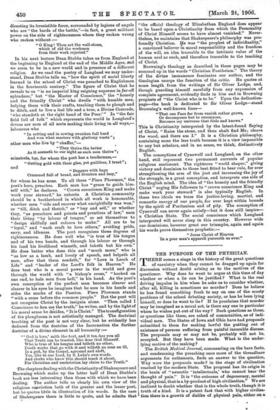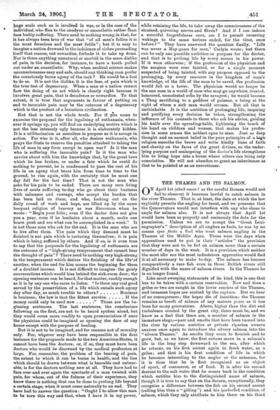THE PURPOSE OF THE PHYSICIAN. T HERE comes a stage in
the history of the great questions of casuistry when they cannot be dragged up again for discussion without doubt arising as to the motives of the questioner. Why does he want to argue at this time of day whether or when a lie can be justified ? What is the real driving impulse in him when he asks us to consider whether, after all, killing is sometimes no murder ? Does be believe he has found something fresh to say on one of the musty problems of the school debating society, or has he been lying himself, or does he want to lie ? If he proclaims that murder may be imagined as a moral act, is there any one in particular whom he wishes put out of the way ? Such questions as those, or questions like them, are asked of communities, as of indi- vidual men. The States of Iowa and Ohio have had proposals submitted to them for making lawful the putting out of existence of persona suffering from painful incurable disease. The proposals may or may not be, probably will not be, accepted. But they have been made. What is the under- lying motive of the making ?
The British Medical Journal, commenting on the bare facts, and condemning the preaching once more of the threadbare arguments for euthanasia, finds an answer to the question, Why were the proposals made ? in the stage of civilisation reached by the modern State. The proposal has its origin in the brain of " neurotic intellectuals,' who cannot bear the thought of pain." It is "the outcome of degeneracy, mental and physical, that is a by-product of high civilisation." We are inclined to doubt whether that is the whole truth, though it is truth of a kind. It is a patent fact that with higher civilisa- tion there is a growth of dislike of physical paln, either on a huge scale such as is involved in war, or in the case of the • individual, who flies to the anodyne or anaesthetic rather than face bodily suffering. There need be nothing wrong in that, for it has always been true of war that "of all men's follies it is the most ferocious and the most futile" ; but it is easy to imagine a nation drowned in the indolence of riches persuading itself that reason, not cowardice, fOrbade it to take up arms. Nor is there anything unnatural or morbid in the mere dislike of pain, in the decision, for instance, to have a tooth pulled out under an anaesthetic. Why, when medical science makes unconsciousness easy and safe, should any thinking man prefer the consciously borne agony of the rack P He would be a fool to do so. It is not the dislike, it is the fear, of pain which is the true test of degeneracy. When a man or a nation cannot fate the doing of an act which is clearly right because it involves great pain, that is decadence or cowardice. To that extent, it is true that arguments in favour of putting an end to incurable pain may be the outcome of a degeneracy which is the product of a luxurious civilisation.
But that is not the whole truth. For if yOu come to examine the proposal for the legalising of euthanasia, when- ever it springs up, you will find an underlying motive which is not the less intensely ugly because it is elaborately hidden. It is a utilitarianism as merciless in purpose as it is savage in action. For who is it, after all, who desires euthanasia, who prays the State to remove the penalties attached to taking the life of man in any form except in open war P Is it the man who is suffering the incurable pain? Is it the man who carries about with him the knowledge that, by the great laws which he has broken, or under a fate which he could do nothing to prevent, he is condemned to pass the rest of his life in an agony that bears him from time to time to the ground, to rise again, with the certainty that he must one day fall for the last time P That is not the man who asks for his pain to be ended. There are many, men living lives of acute suffering to-day who go about their business with calmness and courage, who accept the burden that has been laid on them, and who, looking out on the daily round of work and hope, are lifted up by the same buoyant religion of bravery as was Stevenson when he wrote : " Begin your folio; even if the doctor does not give you a year, even if he hesitates about a month, make one brave push and see what can be accomplished im a week." It is not those men who ask for the end. It is the men who are to live after them. The pain which they demand must be finished is not pain which is torturing themselves; it is pain which is being suffered by others. And if so, is it even true to say that the proposals for the legalising of euthanasia are the outcome of a " high-Strung temperament that cannot bear the thought of pain" ? There need be nothing very high-strung in the temperament which desires the finishing of the life'of another, when the end for him means the beginning for them of a doubled income. It is not difficult to imagine the grisly conversations which would hiss behind the sick-room door; the opening sentences can be heard, for that matter, readily enough as it is by any one who cares to listen. " Is there any real good served by the preseriation of a life which entails such agony
day after day, so much trouble to others ? Business is business; the law is that the fittest survive If the money could only be used now " Those are the be- ginning sentences. The last sentences, the conclusions following on the first, are not to be heard spoken aloud, but they would come more readily to open pronunciation if once the physician could be imagined as opening the door of any house except with the purpose of healing.
But it is not to be imagined, and for reasons not of morality only. For, whpever may have been responsible in the first instance for the proposals made to the two American States, it cannot have been the doctors; or, if so, they must have been doctors who would be disowned by the medical profession at large. For, remember, the problem of the bearing of .pain, the extent to which it can be borne in health,•and the line which should be drawn between what is bearable and unbear- able, is for the doctors nothing new at all. They have had to face over and over again the spectacle of a man twisted with pain, for whom, out of the fulness of their experience, they know there is nothing that can be done to prolong life beyond a certain stage, when it must come naturally to an end. They have had to answer the question: "Ought I to allow this man to be torn this way and that, when I have it in my power,
while retaining the life, to take away the consciousness of the strained, quivering nerves and fibres P And if I can induce • a merciful forgetfulness once, am I to permit recurring wakings to the same torture ended, for the time, once before P " They have answered the question finally. "Life was never a May-game for men," Carlyle wrote; but there can be only one possible ambition or purpose for the doctor, and that is to prolong life by every means in his power. If it were otherwise; if the profession of the physician and the surgeon were ever tainted, or for a single moment suspected of being tainted, with any purpose opposed to the prolonging, by every resource in the kingdom of man's knowledge, of the life of the man to be saved, the profession would fall as a tower. The physician would no longer be the one man in a world of men who may go anywhere, trusted, honoured, unmolested even by the savagest ; he would become a Thug sacrificing to a goddess of guineas, a being at the sight of whom a sick man would scream. But all that is unthinkable. It is the ambition of prolonging life, inspiring and purifying every decision he takes, strengthening the influence of his counsels to those who ask his advice, guiding his knife over the operating-table, lightening the touch of his band on children and women, that makes his profes- sion in some senses the noblest open to man. Just as deep thought and an earnest belief in the pure principles of a high religion smoothe the brows and write kindly lines of faith and charity on the faces of the great divines, so the under- lying purpose and mainspring of the doctor's life strengthens him to bring hope into a house where others can bring only consolation. He will not abandon so great an inheritance as that to be pointed at as an executioner.











































 Previous page
Previous page